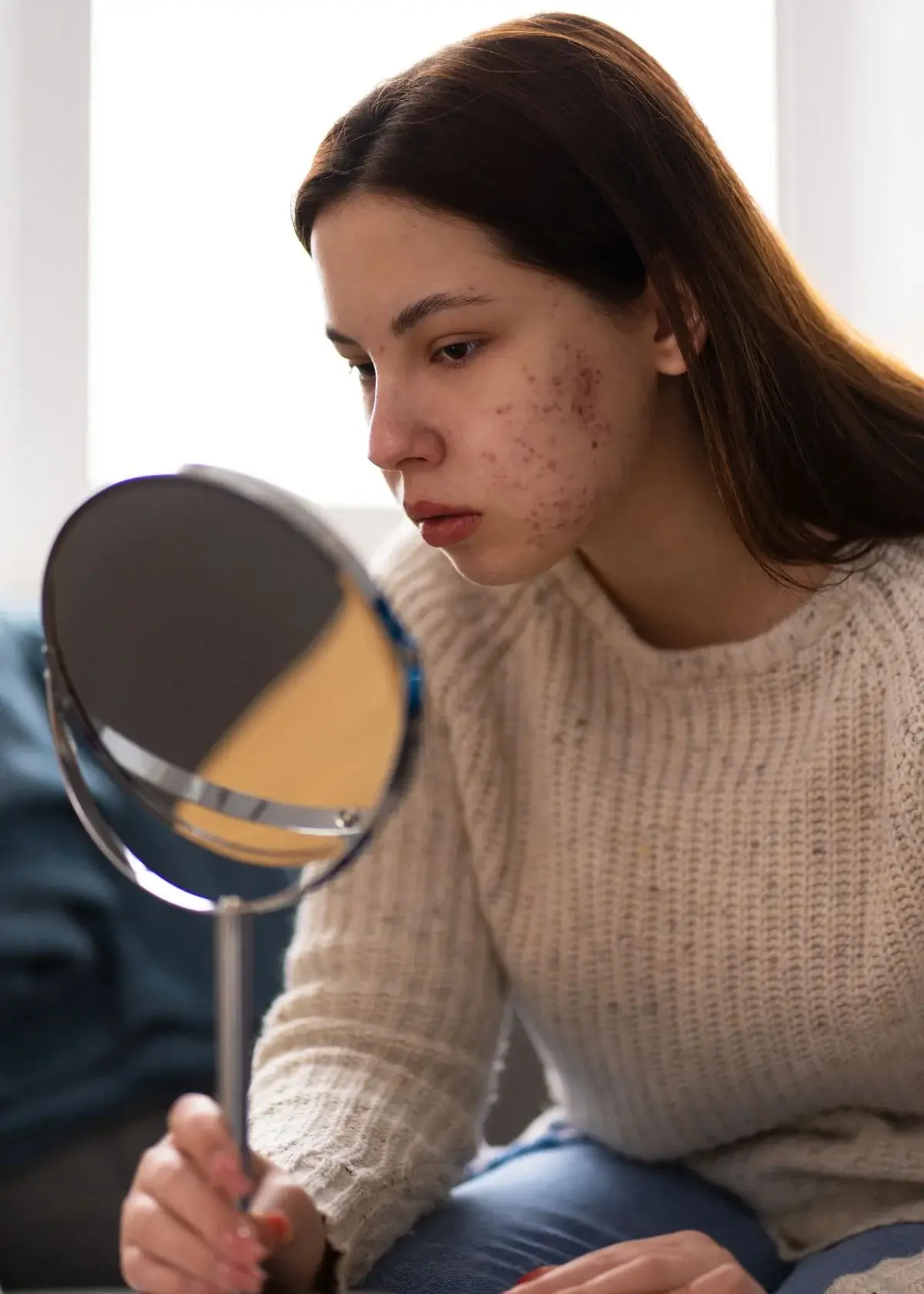Hormonal cystic acne is a severe form of acne that occurs due to hormonal imbalances in the body. Unlike other types of acne, which are often caused by clogged pores and bacteria, hormonal cystic acne is primarily influenced by hormonal fluctuations. Understanding the underlying factors can help individuals better navigate their acne journey and find appropriate solutions.
Hormonal Factors
Hormones are significant in acne development, particularly in hormonal cystic acne. Fluctuations in hormone levels can trigger the overproduction of sebum, an oily substance that clogs pores and leads to inflammation. Several hormonal changes can contribute to the development of hormonal cystic acne, including:
- Puberty: During adolescence, hormonal changes occur as the body matures, leading to an increase in sebum production and the development of acne.
- Menstrual Cycle: Hormonal fluctuations during the menstrual cycle can cause breakouts, particularly around the chin and jawline.
- Pregnancy: Pregnancy hormones can stimulate sebum production, resulting in increased acne activity for some women.
- Menopause: Hormonal imbalances during menopause can contribute to the development of hormonal acne.
Genetic Predisposition
Genetics also play a role in acne susceptibility. If your parents or close relatives have a history of hormonal acne, you may be more likely to experience it as well. Genetic factors can influence sebum production, the body's inflammatory response, and the overall sensitivity of the skin, all of which contribute to acne development.
Diet and Lifestyle
While diet and lifestyle choices may not directly cause hormonal cystic acne, they can influence hormonal balance, exacerbating acne symptoms. Poor dietary habits, such as excessive sugary or processed foods, can increase insulin levels, triggering hormonal fluctuations. Besides, a sedentary lifestyle and chronic stress can disrupt hormonal balance, potentially worsening acne symptoms.
Stress and Hormonal Imbalance
Stress is a common trigger for hormonal imbalances, which can contribute to the development of hormonal cystic acne. When the body is under stress, it produces cortisol, the stress hormone. Elevated cortisol levels can disrupt hormonal balance, leading to increased sebum production and inflammation in the skin. Managing stress through relaxation techniques, exercise, and self-care practices can help alleviate hormonal acne symptoms.
Skincare and Hormonal Acne
While skincare alone may not address the root cause of hormonal cystic acne, it can be crucial in managing and minimizing breakouts. A skincare routine tailored to acne-prone skin and designed to reduce inflammation, control sebum production, and promote skin renewal can be beneficial. Look for products containing salicylic acid, benzoyl peroxide, and retinoids known for their acne-fighting properties.
Understanding the causes of hormonal cystic acne is the first step toward effective management and treatment. Hormonal imbalances, genetic predispositions, diet and lifestyle choices, stress, and skincare routines all contribute to the development and severity of hormonal cystic acne. It's important to remember that each individual's experience with acne is unique, and finding the right treatment often requires a personalized approach. Consult a dermatologist or healthcare professional to develop a tailored plan for your needs. With patience, consistency, and the right treatment, you can effectively manage hormonal cystic acne and achieve clearer, healthier skin.
After conducting extensive research to identify the most effective solution for hormonal cystic acne, we are thrilled to introduce a revolutionary product that specifically addresses this skincare concern. Our thorough exploration has resulted in a breakthrough solution that targets hormonal imbalances, providing a powerful remedy for cystic acne. To discover your new go-to treatment for hormonal cystic acne, simply follow the provided link. This innovative product combines cutting-edge science with proven results to offer a comprehensive solution for achieving clearer and healthier skin. Say farewell to the challenges of hormonal cystic acne and embrace newfound confidence in your complexion. Click the link to uncover this transformative solution today!
What hormones are typically involved in hormonal cystic acne?
Hormonal cystic acne's intricate genesis is closely tied to androgens, particularly testosterone. Androgens orchestrate a cascade of events, inducing an imbalance significantly amplifies sebum production. Elevated androgen levels are the catalyst, stimulating sebaceous glands to hyper-produce oil. In synergy with the routine shedding of skin cells, this surplus oil establishes an environment ripe for developing cystic acne. Understanding the nuanced role of androgens in modulating the skin's physiology illuminates their central significance in forming the deep-seated nodules characteristic of hormonal cystic acne.

What are the common symptoms of hormonal cystic acne?
The symptomatic landscape of hormonal cystic acne is marked by distinct features, encompassing the emergence of substantial, painful nodules beneath the skin's surface. These deep-seated lesions, often resistant to standard acne treatments, depart from the more superficial manifestations of typical acne. Symptom severity can vary, yet the persistent discomfort and the looming risk of scarring underscore the imperative for proactive, targeted interventions. Recognizing the profound impact of these symptoms on an individual's quality of life is paramount in devising comprehensive strategies to manage the multifaceted challenges posed by hormonal cystic acne effectively.

What distinguishes hormonal cystic acne from other types of acne?
The unique nature of hormonal cystic acne lies in the depth and the character of the skin lesions it gives rise to. Unlike more prevalent forms of acne, hormonal cystic acne is typified by the development of cyst-like bumps that penetrate deep into the dermal layers. This distinguishing characteristic and underlying hormonal fluctuations impart a heightened resilience to conventional acne treatments. Addressing hormonal cystic acne mandates the implementation of specialized approaches that recognize and cater to its persistent and inflammatory nature, setting it apart from the more commonplace presentations of acne.

How does hormonal imbalance contribute to cystic acne development?
Hormonal imbalance, specifically the ebbs and flows in androgen levels, stands as a linchpin in the intricate genesis of cystic acne. Elevated androgens act as instigators, coaxing sebaceous glands into a hyperactive state of oil production, fostering an environment conducive to acne formation. This surplus oil, entwined with the routine shedding of skin cells, instigates the clogging of hair follicles. The ensuing obstruction and subsequent inflammation lend credence to the distinctive features of deep-seated nodules that hallmark hormonal cystic acne.

How do hormonal changes affect sebum production in the skin?
Hormonal fluxes profoundly influence sebum production within the skin, mainly when characterized by an elevation in androgen levels. Androgens function as potent stimulants, goading sebaceous glands to unleash excess oil onto the skin's surface. This surplus oil, when unregulated, disrupts the delicate equilibrium of the skin's natural lubrication. Unchecked, this excess oil contributes to the genesis of cystic acne, acting as a catalyst for the obstruction of hair follicles. The resultant formation of deep-seated nodules further underscores the far-reaching impact of hormonal changes on the intricate physiological processes governing the skin.
Should hormonal therapy be a long-term solution for cystic acne?
The efficacy of hormonal therapy in addressing the root cause of cystic acne, namely hormonal imbalances, necessitates thoughtful consideration for its long-term utilization. Beyond its therapeutic benefits, acknowledging potential side effects becomes pivotal, demanding a comprehensive evaluation by a qualified healthcare professional. This evaluation serves as the cornerstone for determining the appropriateness and duration of hormonal treatments. Emphasizing a holistic and sustainable approach, this process considers individual health factors, underscoring the indispensability of a healthcare professional's guidance. Consultation is instrumental in crafting a nuanced and personalized strategy that effectively manages hormonal cystic acne over an extended temporal horizon.







